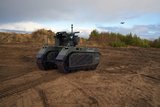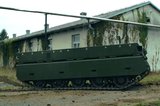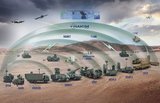NIITEK awarded HMDS delivery order
Chemring’s US subsidiary, Non-Intrusive Inspection Technology (NIITEK) has been awarded an additional delivery order to provide spares for the Husky Mounted Detection System (HMDS) to the US Army.
The delivery order is valued at $24 million, and supplements a $9 million order received in February 2013. Together, these orders are part of the $579 million multi-year HMDS ground penetrating radar indefinite-delivery/indefinite-quantity (IDIQ) contract that was awarded on 30 April 2012. All items will be delivered on a firm fixed price basis by April 2014.
The NIITEK HMDS is a high-performance Ground Penetrating Radar (GPR) system which functions on blast resistant vehicles to provide real-time identification of anti-vehicular landmines and other explosive hazards on main supply routes and open areas such as minefields.
Mark Papworth, chief executive, Chemring, said: ‘NIITEK’s HMDS products perform an essential role in protecting troops against the threat of improvised explosive devices. We are delighted that these additional delivery orders enable us to continue our proven support to the US Army, and that NIITEK will continue to deliver critical spares to ensure their fleet is mission ready.’
More from Land Warfare
-
![World Defense Show 2026: DOK-ING working on MV-8 variants and reveals specs ahead of Eurosatory]()
World Defense Show 2026: DOK-ING working on MV-8 variants and reveals specs ahead of Eurosatory
The Croatian company began the development of the MV-8 modular uncrewed platform in the early 2020s. Specifications for the vehicle were revealed to Shephard at World Defense Show 2026.
-
![World Defense Show 2026: Turkish and European industries will cooperate, says Aselsan boss]()
World Defense Show 2026: Turkish and European industries will cooperate, says Aselsan boss
Aselsan was formed 50 years ago in response to difficulties Turkey was facing in sourcing major systems internationally. While some challenges still remain, company president Ahmet Akyol believes a rapprochement is possible.
-
![World Defense Show 2026: Russia reveals details of new loitering munition]()
World Defense Show 2026: Russia reveals details of new loitering munition
The Kalashnikov RUS-PE cannister-launched man-portable loitering munition was displayed as a model at World Defense Show 2026 with a company official telling Shephard it was “in service and in low-rate initial production”.
-
![World Defense Show 2026: MARSS displays new Nation Shield air defence C2 system]()
World Defense Show 2026: MARSS displays new Nation Shield air defence C2 system
Nation Shield is the latest iteration of the MARSS C2 system and is designed to provide C2 further forward along with more capable air defence.






















